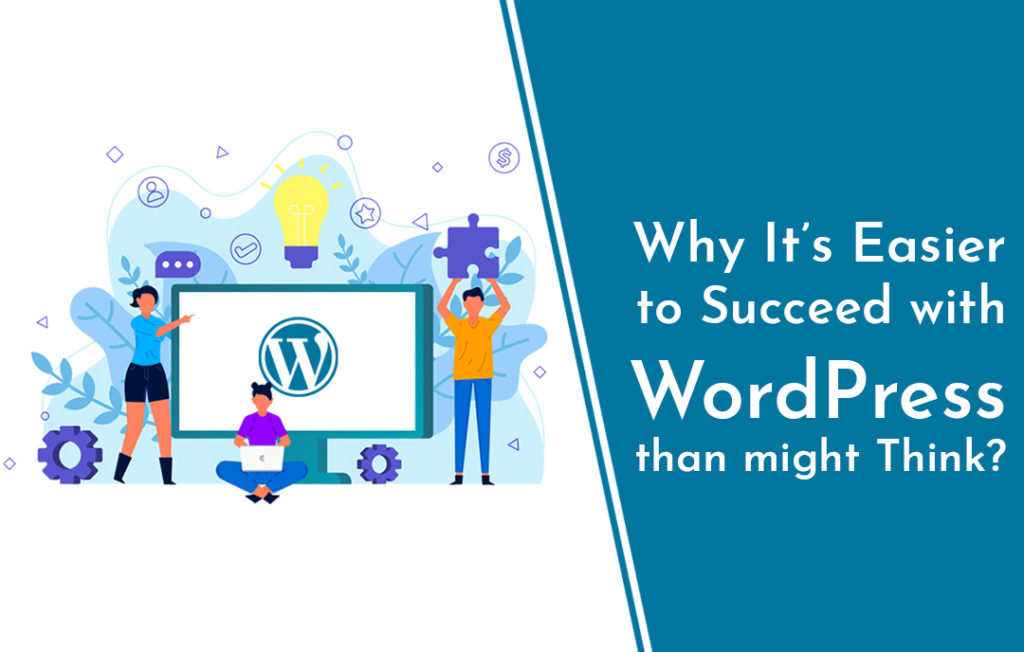Creating awesome CMS goes a long way, but making sure the content is showcased the most impactful way is the key to your website’s success. Visitors should feel engaged with the content and it should gently nurture them towards the intended objective.
To achieve these desired results you’ll need a fantastic content management system (CMS) to curate your website’s content. One of the leading CMSs available in the market is WordPress.
WordPress is one of the most used blogging and website creation platforms. How to use this platform to carve out a brilliant piece of the online world for yourself? Take a glimpse into the world of WordPress Developers and its comparative retrospective with other CMSs available.
What is WordPress?
WordPress is quite a simple and convenient content management system (CMS). It is one, amongst the plethora of options available for the creation of websites, like Magento, .NET, Joomla, and others.
What are these Content Management Systems (CMS)?
CMS are arrays of processes in the digital world that help you assimilate information, manage that information, and finally, publish the refined information. There are several roles in CMS, including Creator, Editor, Publisher, Administrator, and Viewer. Benefits of CMS include flexibility for developers, archive capabilities, workflow management, quick and easy page management, security, and search-engine friendly.
Contributors (creators) can add or remove content as you wish. The content can be in the format of text or images. Furthermore, WordPress can be used for developing blogs or web pages – it is suitable for all purposes, business and personal, alike.
Technically, WordPress is a free open source CMS based on PHP or MySQL publishing system that runs on the web with the help of a web hosting service. It uses templates and several plugins that are easy to use. Even people without the knowledge of PHP or any other languages can easily make the necessary changes in WordPress.
Why WordPress?
Some of the features or advantages of WordPress are listed here:
- It is SEO friendly and thus, will help you reach your desired customers. Top-notch plugins like SEO, Rank Math and SEOPress are available on WordPress however it is advisable to use them one at a time to avoid plugin conflict.
- It provides significant cost and resource benefits. Most of the available features are free and simple to make use of.
- With its auto pinging feature, WordPress automatically notifies other websites whenever your website gets updated for major indexes. This optimizes web ranking quite a bit.
- It is effortless; even a person without any HTML knowledge can easily manage his own WordPress website/s.
- It can be accessed from any browser or medium. It has numerous blogs, e-books, video tutorials, message boards to help beginners as well as advanced users. WordPress has a vast community, always happy to help out when someone is in a pinch in terms of development.
How does WordPress stack up against competitors?
There are lots of CMSs available in the market which makes it tough to choose the right one that suits one’s business needs. Some of the critical aspects you should consider while making the final decision are hosting, costs, the difficulty of use, designs, flexibility, and security.
WordPress Compared with Joomla
Both of these content management systems come very close to each other in terms of customization & functionality, which is why they are usually used by bloggers and designers worldwide.
- In order to make full use of the Joomla! platform you’ll need more technical skills than WordPress. Although WordPress is still considered one of the best platforms for newbies, Joomla! is not very far behind when it comes to ease of use. With just a little effort in understanding Joomla!’s fundamentals, you’ll be able to create highly complex websites.
- Customizable themes are available in both the CMS platforms, However, WordPress offers a lot more themes than Joomla!. Both platforms have an intuitive user interface that enables users to update and modify their site’s layout.
- New software versions are regularly released for both platforms, and every update requires all plugins and extensions to be individually updated. The only difference being, Joomla! updates are a bit more frequent and sometimes become tedious. Joomla’s! Another similarity to WordPress is that both platforms have immense developer communities from which users can avail themselves a variety of free open-source plugins and extensions. In case you require multi-language support, it is already built-in for Joomla! But you’ll have to download a separate plugin to avail the same service on the WordPress platform
- Joomla! Does have a slightly complicated interface and even seasoned developers have to go through a learning curve in order to master it.
WordPress compared with Drupal
- While both of them were released a couple of years apart, WordPress quickly gained recognition due to its ease of use. Whereas Drupal needs some more know-how, if you can do it then you’ll get amazing results otherwise you’ll be in trouble.
- While both platforms are available free of cost to download and use. Drupal will cost more as there are not many developers trained on it.
- Drupal Has an intuitive and minimalistic interface with pre-configured structures that let you develop a Highly customized website without the need for extensive coding. WordPress also provides tremendous content management capabilities.
- Websites developed by Drupal don’t require as many plugins as WordPress and hence give better performance.
- When it comes to security both CMSs give impeccable results as long as all plugins are updated regularly. The only thing’s WordPress plugins are easily updated as compared to updating Drupal modules.
WordPress compared with Squarespace
If you require a straightforward content management interface then Squarespace will get the job done but it does lack a few features for customization and add-ons. Let’s have a look at some more comparisons.
- Where WordPress provides you with a self-hosted website option, Squarespace hosted websites do involve a certain cost of hosting as a monthly price. With Squarespace’s bundled approach their hosting is compatible and optimized for your website this includes providing web analytics, monitoring your site speed, and website security.
- As mentioned before the number of options available in Squarespace is limited but this also makes it very simple to navigate and very easy to use even an absolute beginner can write and publish content with relative ease. Functionalities like adding images, video, and audio files are more streamlined than WordPress.
- Squarespace offers beautiful design templates that give any CMS a run for its money. However, customizing a template requires extensive knowledge of JSON and CSS.
- E-commerce capabilities with Squarespace are sufficient if you want to sell a few products on a single page, but they prove to be inadequate for business websites that deal primarily in e-commerce. With restrictions on how many products you can sell makes it much more expensive than WordPress shared hosting to sell features.
Summing it up
As you can see WordPress has many benefits that surpass even some of the leaders of CMS in the market. However, you must think about your business requirements very careful while deciding on a CMS for your business.
It is also recommended that you consult a professional developer before making the final decision. In case you have any questions regarding WordPress development services, feel free to contact us anytime. We’ll be happy to help!
Raj is CEO & Founder of QL Tech, Located in Perth, Australia, QL Tech is one of the best companies that offer unique Web Development & Digital Marketing Services by the virtue of its dedicated professionals. Our professionals are extremely proficient in offering WordPress development services.





0 Comments